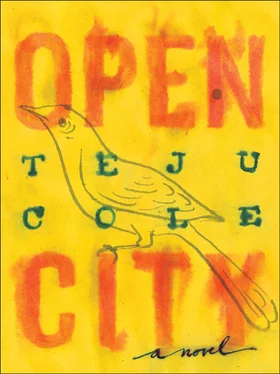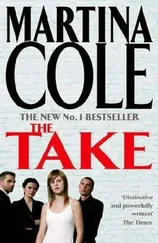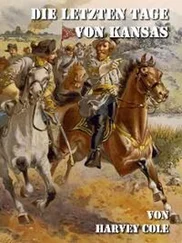I got on the subway at 110th Street. I disembarked at 14th Street, and cut across to the East Side, and I walked all the way down the Bowery, with no particular destination in mind, past the innumerable shops selling lamps and restaurant equipment, shops that, from the outside, resembled exotic aviaries. I finally came to a busy square on East Broadway. It was only a short walk from the part of Chinatown that was most popular with tourists, but it felt like an entire world away, for here no tourists were to be found and almost no one, in fact, who was not originally from East Asia. The signs on the shops, restaurants, businesses, and advertisements were in Chinese characters, and only occasionally were these supplemented with English translations. In the middle of the square itself, a square that was hardly more than a traffic island bounded by the crossing of seven streets, there stood the statue that, from a distance, I guessed was of an emperor or an ancient poet but that turned out to be Lin Zexu, the nineteenth-century antinarcotics activist. The severe monument commemorating this hero of the Opium Wars — he had been appointed commissioner in Guangzhou in 1839, and was much hated by the British for his role in impeding their drug traffic — was the one around which now pigeons flocked. They streaked it with gray guano, enriching the dried white material they had earlier left on the dark green finish of the statue’s robes and head. A few people ate ice cream or fried snacks as they sat on the benches of the traffic island, or walked around the statue enjoying the sunshine. Little sign remained of what the neighborhood had been in the early 1800s: an open-air market for livestock and horses, a district of flophouses, tattoo parlors, and saloons.
Everyone in sight seemed to be Chinese, or could be easily taken for Chinese, excepting me and one other person — a man stripped to the waist, and vigorously wiping his arms and chest with a rag. There was an unearthly shine to his body, as though he were already doused in oil, but whether he was applying the shine, or trying to remove it, I could not tell. He was silhouette dark, and his body bore signs either of long hours at the gym or of a lifetime of physical labor. No one paid any attention to him as he meticulously went about this task, which he soon interrupted to pick up the bicycle lying at his feet. He moved the bicycle out of the sun, so that he was more securely in the shadow cast by Lin Zexu’s monument. He then resumed his wiping, or application, of the oily material. His entire body glistened, neither more nor less than when he started, and he himself was like a bronze statue. The man then stuffed the rag into the back pocket of his jeans and, as one suddenly struck by a forgotten errand would do, jumped on the bicycle and sped away down one of the smaller streets, weaving in and out of traffic as he did so, until I could no longer see his bright black back among the throng in the direct glare of the sun.
Presently, I, too, went down one of the side streets, an even smaller and more congested one, along which prewar buildings jostled vertiginously, each with an elaborate fire escape that it offered like a transparent mask to the world. Electric wires, wooden poles, abandoned buntings, and a thicket of signs clotted the façades all the way up to the tops of the four- and five-story buildings. The shop windows advertised dental products, tea, and herbs. Large bins were filled to the brim with gnarled ginger and medicinal roots, and there was such a complete motley of goods and services that, after a while, to see a shop window full of hanging carcasses of roast duck succeeded by another one crammed with tailors’ dummies, yet another full of fluttering printed leaflets in a half dozen sun-bleached variants of red, and that in its turn followed by a jumble of bronze and porcelain Buddha figures, came to seem a natural progression. Into this last shop, I entered, to escape the dizzying activity of the tiny street.
The shop, of which I was the sole customer, was a microcosm of Chinatown itself, with an endless array of curious objects: a profusion of bamboo cages as well as finely worked metal ones, hanging like lampshades from the ceiling; hand-carved chess sets on the ancient-looking bar between the customer and the shopkeeper’s bay; imitation Ming Dynasty lacquerware, which ranged in size from tiny decorative pots to round-bellied vases large enough to conceal a man; humorous pamphlets of the “Confucius say” variety, which had been printed in English in Hong Kong and which gave advice to those gentlemen who wished to find success with women; fine wooden chopsticks set on porcelain chopstick stands; glass bowls of every hue, thickness, and design; and, in a seemingly endless glass-fronted gallery high above the regular shelves, a series of brightly painted masks that ran through every facial expression possible in the dramatist’s art.
In the midst of this cornucopia sat an old woman, who, having looked up briefly when I came in, was now fully reabsorbed in her Chinese newspaper, preserving a hermetic air that, it was easy to believe, hadn’t been disturbed since horses drank water from the troughs outside. Standing there in that quiet, mote-filled shop, with the ceiling fans creaking overhead, and the wood-paneled walls disclosing nothing of our century, I felt as if I had stumbled into a kink in time and place, that I could easily have been in any one of the many countries to which Chinese merchants had traveled and, for as long as trade had been global, set up their goods for sale. And, right away, as though to confirm this illusion, or at least to extend it, the old woman said something to me in Chinese and gestured outside. I saw a boy in a ceremonial uniform walk by with a bass drum. He was presently followed by a row of men with brass instruments, none of them playing, but all walking solemnly in step, marching down the narrow street, which seemed magically to have cleared itself of shoppers for their passage. The old woman and I watched them from the eerie calm of the shop, in which only the ceiling fans were audible, and row after row of these members of a Chinese marching band marched past, with their tubas, trombones, clarinets, trumpets: men of all ages, some with jowled faces, others looking as if they were just reaching puberty, with the first black traces of peach fuzz on their chins, but all with the most profound earnestness, carrying their golden instruments aloft, row after row, until, as if to bookend them, there marched past at the last a trio of snare drums and a final massive bass drum carried by an enormous man. I followed them with my eyes until the procession trickled beyond the last of the bronze Buddhas that sat looking outward from the shop’s window. The Buddhas smiled at the scene with familiar serenity, and all the smiles seemed to me to be one smile, that of those who had stepped beyond human worries, the archaic smile that also played on the lips on the funeral steles of Greek kouroi, smiles that portended not pleasure but rather total detachment. From beyond the shop, the old lady and I heard the first series of notes from the trumpet, playing for two bars. Those twelve notes, spiritual cousins of the offstage clarion in Mahler’s Second Symphony, were taken up by the entire band. It was a chromatic, blues-inflected figure that must have had its first life in a mission hymn, a dirge that was like a tempest heard from far away, or the growl of waves when the sea is out of sight. The song wasn’t one I was able to identify but, in all respects, it matched the simple sincerity of songs I had last sung in the school yard of the Nigerian Military School, songs from the Anglican songbook Songs of Praise , which were for us a daily ritual, many years before and thousands of miles away from where I stood in that dusty, sun-suffused shop. I trembled as the throaty chorus of brass instruments spilled into that space, as the tuba ambled across the lower notes, and as the whole sound came into the shop like shafts of interrupted light. And then, with almost imperceptible slowness, the music began to fall in volume as the band marched farther and farther into the noise of the city.
Читать дальше












